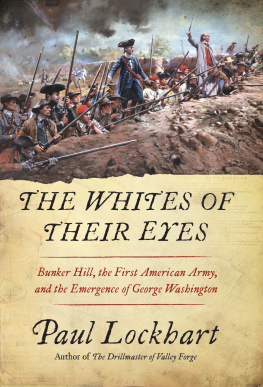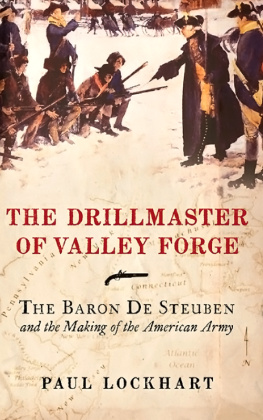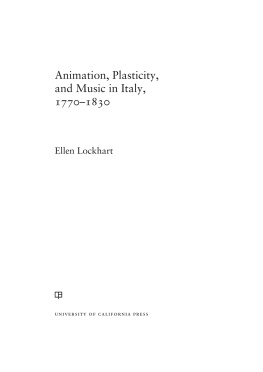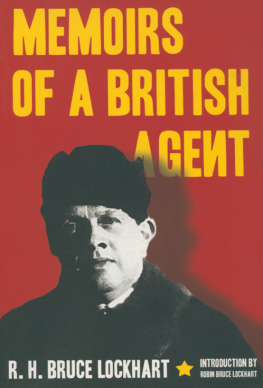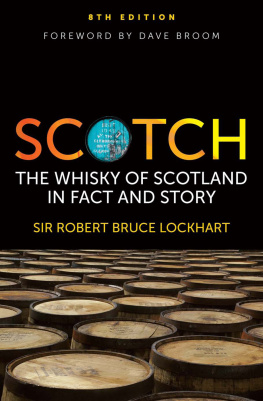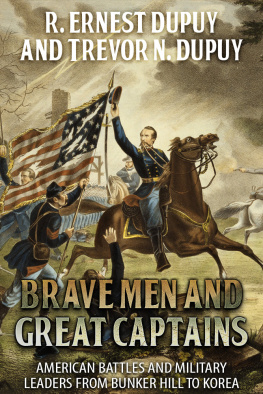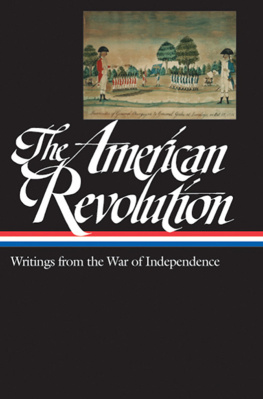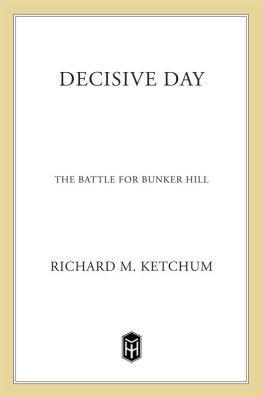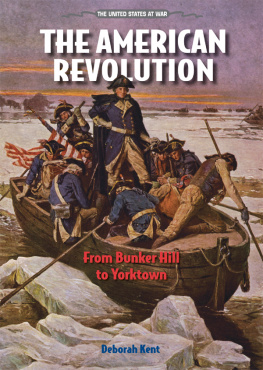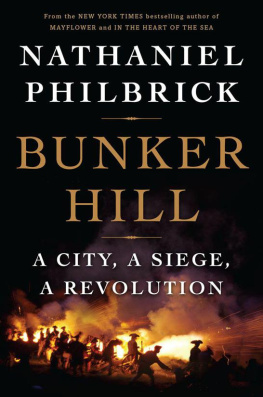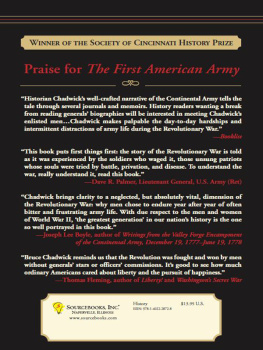THE
WHITES
OF
THEIR EYES
*
Bunker Hill,
the First American Army,
and the Emergence of George Washington
*
Paul Lockhart

To my son, Alex
With love, from Daddy
Contents
Boston, Massachusetts
Friday, June 17, 1825
F orty-two years had passed since the Revolution had drawn to a close, fifty since it had begun, in this very town. During those years, Boston had become something very much different from what it had been in the days of the Massacre and the Tea Party, of Paul Reveres ride and the bloodshed on Lexington Green, a place that would have been unrecognizable to those who had lived through those mythic events. Boston was now everything that America had come to be: big, loud, brash, contentious, exuberant. And growing. Ten thousand souls had called the place home in 1775; now there were nearly sixty thousand, and there was no sign that the burgeoning growth would stop anytime soon. The only thing that could stop it was geography, and modern Bostonians were doing their best to make sure that that didnt happen. If the city would no longer fit within the confines of the old Shawmut peninsula, then the geography had to be changed. With spade and pick, the people of Boston altered the very landscape itself, laying low the hills, populating every empty space with homes and warehouses, filling the shallow waters of the harbor nearby to make more roomfor more buildings, more commerce, more people.
Beacon Hill had lost its beacon, and was only a mere stub of its former self. The ancient and majestic Trimountain had once towered over the city, but it stood in the way of progress and hence it had to go: the summit of Beacon Hill, the tallest peak in the Trimountain, stood sixty feet below its former height. Laborers carted the earth from the truncated hill to fill the old Mill Pond on the North End. The open green spaces west and south of town rapidly filled in with new neighborhoods until only the Common remained. The physical reminders of the Revolutionary past were dwindling by the year. Within a few decades, mostlike the former residence of the royal governors, Province Housewould be gone, and only a handful of old churches and government buildings would survive. Boston was a growing city, mindful of its gleaming future, boundlessly confident. Sentimentality was something it couldnt afford.
But today was different. Today, Boston would revel in its past, glory in great deeds of arms, congratulate itself for having done so much to author the new republic. And it would do so in grand style. For fifty years ago this very daya day that had been just as bright and glorious, a day when the air was just as redolent of the sweetness of late spring in New Englandthe sons of Massachusetts and New Hampshire and Connecticut fought and died for the cause of American liberty on a grassy, windswept hill that loomed over Charlestown. There, American citizen-soldiers had dared challenge Britains military might; there the Revolution truly began. Locals called the place Breeds Hill, but in the popular imagination the struggle there was known by another name: the Battle of Bunker Hill.
For several years there had been a humble wooden pillar, lonesome and unprepossessing, placed on the site by the Freemasons to mark the spot where one of their own had fallen in the battle, but to many in Boston it was not tribute enough. In 1823, a group of prominent Bostonians, the great orator and congressman Daniel Webster among them, resolved to erect a more enduring memorial to all those who died in libertys name atop Breeds Hill in 1775. Two years later they had subscribers, money, a design, and land... though ultimately some of that hallowed ground would be sold to raise more funds for the monument. The fiftieth anniversary of the battle seemed a fitting time to lay the cornerstone. The timing was fortuitous, for in that year Boston played host to a distinguished visitor: the Marquis de Lafayette, George Washingtons young protg. He had not fought at Bunker Hill, but at age sixty-seven he was the last surviving general of the Revolutionary War. On the invitation of President James Monroe, Lafayette had come to visit America. He would spend time in all twenty-four states, drawing admiring crowds wherever he went. The old veteran of two revolutions, still boyish in the face, had already visited Boston once during his American tour. He raced back again from Albany in June 1825 just to grace the ceremonies with his magnetic presence.
No one could have asked for a finer morning, sunlit and warm and fragrant, when the solemn procession of celebrants set out through Bostons twisting streets toward the North End, crossing the Charlestown Bridge where the old ferry used to run. Two hundred veterans of the Revolution, some wearing odd items of military gear and uniforms from their service five decades before, led the parade, then a long array of numerous subscribers to the monument, followed by two thousand Freemasons. They were followed by the Marquis de Lafayette himself, in a superb calash drawn by six white horses, with the governor of Massachusetts and a flock of dignitaries bringing up the rear. Seven thousand men and women, it was said, marched in the commemoration.
The procession came to a halt just off High Street at the apex of the hill, where the old redoubt had once stood, now surrounded by farmland and marked by a great pit... the foundation of the new monument. As thousands of spectators watched and cheered, Lafayette and three other men laid the cornerstone; an artillery salute boomed from the hilltop, and the party walked in stately grace to take their places in a special amphitheater erected for this very purpose. Fifteen thousand people crowded into the amphitheater, while thousands more stood outside, covering the hillside in all directions. The noise of the crowd died gradually, to be replaced by the singing of a choir, and then the speakers. First to ascend the podium was Reverend Joseph Thaxter, an eighty-three-year-old Unitarian preacher who had fought at Concord and Bunker Hill, wearing a massive powdered wig underneath his hopelessly outmoded tricorn, clothing and man alike relics of a bygone age. The audience stilled to listen as Reverend Thaxter prayed aloud in his quavering voice, thanking the Almighty for the blessings He had bestowed on happy free America, pointing out almost apologetically that the object of the dedication ceremony was not for the purpose of idolatry, but a standing monument to the rising and future generations, that they may be excited to search the history of our country.
The listeners were moved to tears, it was said, by the prayer, but nothing could contain the crowds excitement when Daniel Webster took the stage. The great orator had given many speeches, and would give many more. His Bunker Hill oration, though, would be considered one of his best, and for decades it found a holy place in schoolbooks, its expressions of patriotic sentiment deemed worthy of memorization. Webster was in fine form, thanking the Revolutionary veterans seated before him, praising the tenacity and the foresight of the Founding Fathers. He spoke of representative government and civil liberties, of tyranny and its malcontents, and every time he praised America for bestowing the gift of freedom on a benighted Europe his audience went wild. Their enthusiasm for the high-flown rhetoric was undampened by the prodigious length of the speech. And in between all his expressions of patriotic reverence, Webster returned again and again to the battle itself. It had been the battle of the Revolution; it forced America to break with the Old World and embark on its own enlightened course. Andnow that there would be a monument to commemorate itthe battle of Bunker Hill could serve as a reminder that Americans must constantly labor to keep the ideals of their Revolutionary forefathers alive. He took that theme, built upon it, and brought it to a thunderous conclusion: And let the sacred obligations which have devolved on this generation, and on us, sink deep into our hearts.... We can win no laurels in a war for independence. Earlier and worthier hands have gathered them all.... But there remains to us a great duty of defence and preservation.... Let our object be, our country, our whole country, and nothing but our country. And, by the blessing of God, may that country itself become a vast and splendid monument, not of oppression and terror, but of Wisdom, of Peace, and of Liberty, upon which the world may gaze with admiration forever!
Next page
